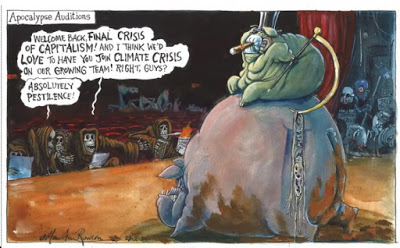A trigger for a crisis driven by profit
 |
| Claudio Katz 05/04/2020 |
March 13 — The global economic crisis is deepening at a rate as dizzying as the pandemic. The reduction in the economic growth rate and the sudden slowdown in the Chinese production system are now behind us. Now the price of oil has collapsed, the stock markets have collapsed and panic has set in in the financial world.
Tradotto da John Catalinotto
Many suggest that economic performance, which was acceptable, was abruptly altered by the coronavirus. They also predict that the pandemic may cause a recurrence of a collapse similar to that of 2008. But on that occasion the guilt of bankers, the greed of speculators and the effects of neoliberal deregulation were immediately visible. Now the only thing being discussed is the origin and consequences of a virus, as if the economy were another patient affected by the earthquake in health.
Coronavirus triggered pre-existing imbalances
In reality, the coronavirus triggered the pre-existing strong tensions in the markets and the enormous imbalances accumulated by contemporary capitalism. It accentuated a slowdown in the economy that had already weakened Europe and was plaguing the United States.
The chasm between that slowdown and the continued euphoria of the stock markets foreshadowed the bursting of the typical bubble, which periodically inflates and punctures Wall Street. The coronavirus has precipitated this collapse, which is not due to any unforeseen illness. It only repeats the well-known pathology of financialization.
Unlike the 2008 bubble, the new one is not located in the indebtedness of families or in the fragility of banks. It is concentrated in the liabilities of large companies (corporate debt) and in the obligations of many governments (sovereign debt). In addition, there are serious suspicions about the health of investment funds, which have increased their preponderance in the purchase and sale of bonds.
The capitalist economy generates these quakes, and no vaccine can ease the upheavals unleashed by the capitalists’ greed for profit. But the misery, unemployment and popular suffering caused by these earthquakes have now been obscured by the terror of the pandemic.
Overproduction of oil
The fall in oil prices also preceded the health tsunami. Two major producers (Russia and Saudi Arabia) and a major player (the United States) dispute the setting of the benchmark price of fuel. This rivalry ruptured the institution that had contained the devaluation of crude oil (OPEC plus 10).
The overproduction that precipitates this cheapening of oil is another underlying imbalance. The surplus of goods — which extends to both commodities and raw materials — is the cause of the great battle between the United States and China.
The two main determinants of the current crisis — financialization and overproduction — affect all corporations, which have either papered the markets with securities or gone into debt in order to raise surplus production they are unable to sell. The coronavirus is totally unaware of these imbalances, but its appearance lit the fuse of an arsenal saturated with goods and money.
Several specialists have also highlighted how the capitalist transformations of the last four decades have affected the magnitude of the pandemic.
They note that previous contaminations — separated by long periods of time — are now breaking out more frequently. This happened with SARS (2002-03), H1N1 swine flu (2009), MERS (2012), Ebola (2014-16), zika (2015) and dengue (2016).


